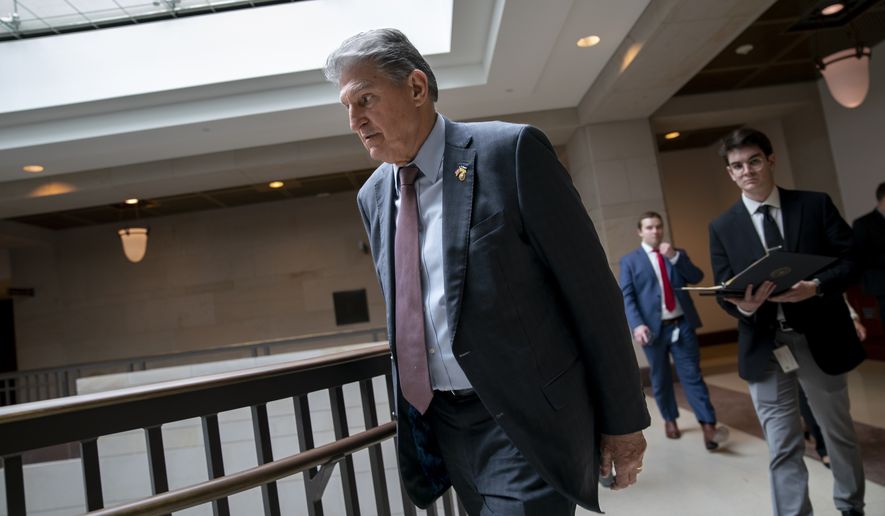Russia’s war against Ukraine may have united most Republicans and Democrats in opposition to Vladimir Putin’s aggression in Eastern Europe, but it’s driven American lawmakers further apart than ever on one particularly partisan policy arena: energy.
Nearly one year after the Russian leader launched an unprovoked attack on its neighbor and as Congress debates domestic energy costs and security, lawmakers remain divided among those who say the volatile markets underscore why more U.S. fossil fuel production is needed and those who argue speeding to renewables will free the country from global oil shortages.
The division was laid bare Thursday, as the chairman of the Senate Energy and Natural Resources Committee — Democrat Joe Manchin III of West Virginia — and the panel’s Republicans said during a hearing on global energy security that the U.S. is failing to meet its mark on energy dominance amid President Biden‘s climate agenda.
Mr. Manchin doubled down on his calls for the administration to bring an “end to the regulatory assault on fossil fuels.”
“Energy companies and shareholders must prioritize energy security, which may mean focusing on growing production before near-term profits. But that also goes for the federal government, which must start balancing lofty climate goals with geopolitical needs,” he said. “The industry also needs the federal government to signal — with both words and actions that we will support the responsible development of all types of energy here in the United States.”
Sen. John Barrasso of Wyoming, the committee’s top Republican, accused Mr. Biden of holding out-of-touch views on energy policy and criticized the president’s State of the Union remarks, where he said oil and natural gas will be needed “for at least another decade.”
“The president also seems to believe that we can stop producing oil and gas in just 10 years. That’s a dangerous fantasy,” Mr. Barrasso said. “It’s no wonder oil and gas companies are thinking twice before investing in American energy. The reality is that the world still runs on oil, natural gas, and coal. It will do so for the foreseeable future — even as we reduce greenhouse gas emissions. Killing American production is not going to change that.”
But Democrats — save for Mr. Manchin — said the past year’s soaring energy costs amid Putin’s war and hamstrung global supplies only emphasize the need to ditch Big Oil and boost clean power sources like wind, solar, hydrogen and nuclear.
Sen. Catherine Cortez Masto, Nevada Democrat, argued her state is a prime example for how the U.S. can produce more crucial components needed for electric vehicle batteries.
“Nevada, and I can’t stress this enough, is really the growing nexus for our clean energy and critical mineral future because it is the only state in the United States that encompasses every facet of the critical mineral and advanced battery economy,” she said.
Sen. Martin Heinrich, New Mexico Democrat, highlighted the “role of electrification, particularly heat pumps,” has had in the “elimination of Europe’s over-dependence on Russian fossil gas.”
Ditte Juul Jørgensen, the European Commission’s director-general for energy, testified to lawmakers that they were not only an “important part of becoming independent from Russian gas and fossil supplies, but also an important part of overall energy transition.”
One of the more contentious moments came when Sen. Josh Hawley, Missouri Republican, grilled a top Department of Energy official over the Biden administration’s anti-fossil fuel policies.
DOE Assistant Secretary of International Affairs Andrew Light rejected Mr. Hawley’s notion that Mr. Biden is stifling fossil fuels production, citing record oil and natural gas forecasts for this year and touting “energy diversification” between fossil fuels and renewables. But he demurred on a question about Mr. Biden limiting the amount of public land and water available to energy companies because it’s under the Interior Department’s jurisdiction.
“Listen, don’t play that game with me. We’re talking about energy production,” Mr. Hawley said. “The facts of the matter are, this president has reduced our ability to be energy independent, and you’re sitting here telling me that increases our energy security. It looks just the opposite to me.”
Sen. Lisa Murkowski, Alaska Republican, said Mr. Biden has the potential to put his money where his mouth is when it comes to increasing production and lowering costs: approving the $8 billion Willow project, a major ConocoPhillips oil project on federal land in Alaska that would produce more than 180,000 barrels of oil per day. However, it’s facing resistance from conservationists and environmentalists as the administration has just weeks to make a decision.
“We have an opportunity in Alaska as we speak,” Ms. Murkowski said. “That’s real production in the here and now.”
• Ramsey Touchberry can be reached at rtouchberry@washingtontimes.com.




Please read our comment policy before commenting.